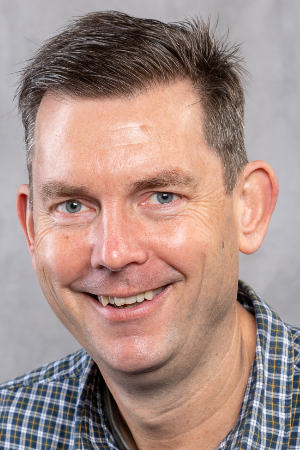GROUP LEADER: Prof. Johann Rohwer
Position: Professor
Office: A108 JC Smuts Building
Phone: +27-(0)21-808-5843
Fax: +27-(0)21-808-5863
Email: jr@sun.ac.za
Research Description
The Research Group for Molecular Systems Biology comprises Profs Jacky Snoep, Johann Rohwer, Jannie Hofmeyr and Dr Dawie van Niekerk. This group studies the control and regulation of cellular processes using theory, computer modelling and experimental approaches. A main project is the development of a theoretical framework, based on control analysis, for describing metabolic regulation in an integrative cellular context that includes metabolism, signal transduction and the genetic hierarchy; aspects of this theory are studied experimentally in yeast, bacteria, and the malaria parasite using controlled cultivation in bioreactors and quantitative analysis with HPLC, mass spectrometry and NMR.
The group is active in the field of computational systems biology, both in the development of kinetic models of real-life systems (plant central carbon metabolism, comparative analysis of glycolysis in various organisms), and of new modelling tools (PySCeS and JWS Online).
Within this research group, my main projects are the following:
The application of in vivo, in situ and in vitro NMR spectroscopy for direct, non-invasive real-time determination of metabolite levels in microbial cells.
Enzyme kinetic parameters are obtained by fitting models of metabolic (sub-)pathways to such NMR time courses. These parameters are then used for kinetic model construction. The method is also used to systematically investigate the effects of macromolecular crowding and pH changes on enzyme-kinetic properties.
Building and extending kinetic models of various cellular systems.
It is a central focus of my work to develop kinetic models of central carbon metabolism in various organisms, notably sucrose metabolism in sugarcane, the citric acid cycle in Arabidopsis, and fermentative free-energy metabolism in Escherichia coli and Zymomonas mobilis.
Modelling cellular redoxin networks.
In collaboration with Dr Ché Pillay from the University of KwaZulu-Natal in Pietermaritzburg, I am developing kinetic models of redoxin networks (thioredoxin, glutaredoxin, peroxiredoxin) in Escherichia coli and Mycobacterium tuberculosis. In addition, we are determining the minimum set of parameters required to kinetically describe the activity of redoxin systems, developing quantitative measures of redox signalling, and developing and applying tools for the comparative analysis of redoxin networks using published models from three organisms (E. coli, erythrocyte and S. pombe).
Modelling glucocorticoid receptor (GR) dimerisation and signalling.
In collaboration with Prof Ann Louw from our department I am developing a kinetic model of the dimerisation process of the GR, focussing on both ligand-dependent and ligand-independent dimerisation. With this model we aim to obtain quantitative measures of how this dimerisation process is controlled and affects GR signalling, both in the absence and presence of ligand.
The development of software tools for computational systems biology within the framework of Python and SciPy.
Using the PySCeS software (
http://pysces.sf.net), which was developed in our group, as a foundation, we are developing an integrated metabolic analysis toolbox (the PySCeS toolbox, or "psctb") that combines a number of tools for the further analysis of systems biology models into a convenient framework:
- Symbolic Control Analysis (symca)
- Generalised Supply-Demand Analysis (ratechar)
- Contribution of thermodynamics and kinetics to enzyme control and regulation (thermokin)
This toolbox allows for a convenient detailed further analysis of kinetic models of cellular pathways, in order to better understand their regulatory behaviour.

